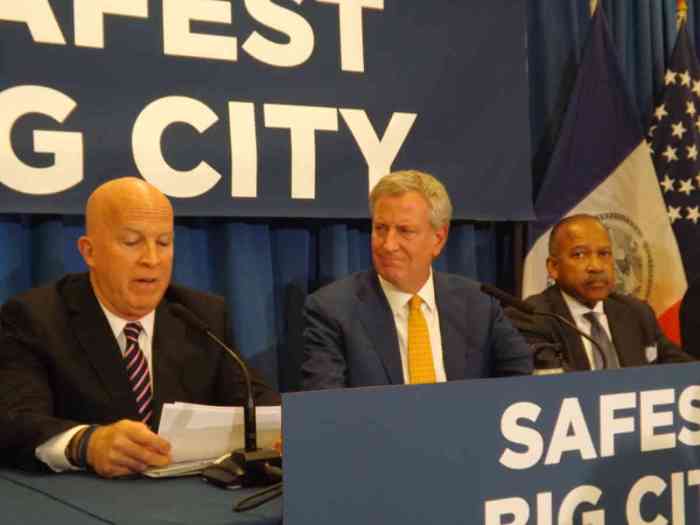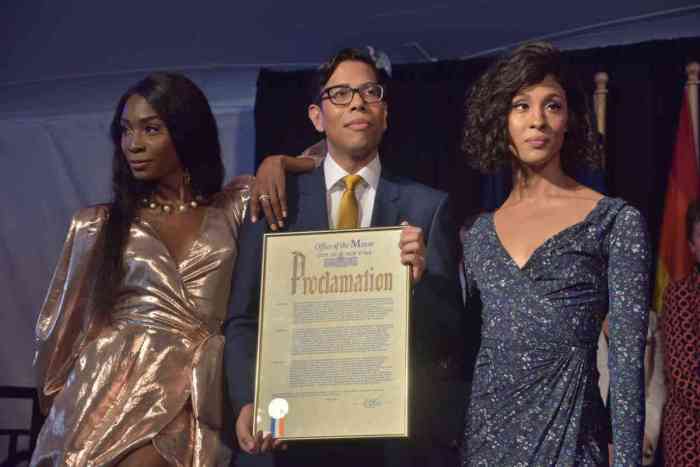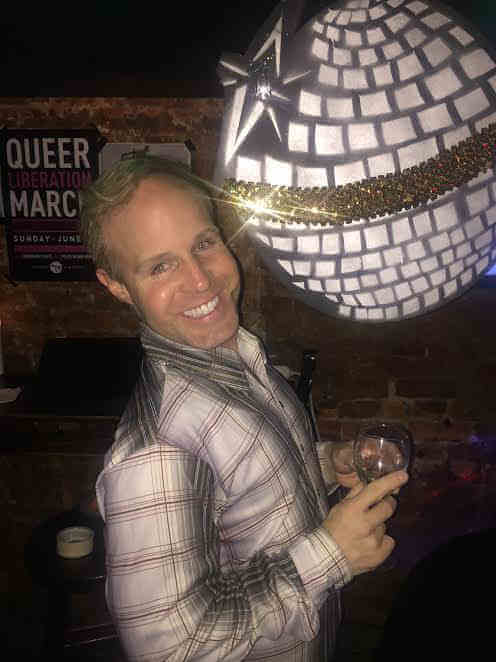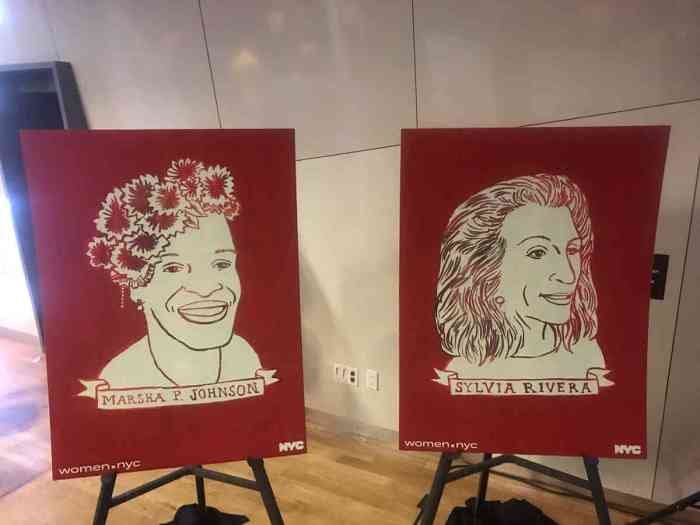LGBT activists at a DC statehood rally prior to the 50th anniversary commemoration of Dr. Martin Luther King's “I Have a Dream” speech. | ANDY HUMM
The world was inspired by Reverend Dr. Martin Luther King, Jr.’s “I Have a Dream” speech on the steps of the Lincoln Memorial in August 1963. Hundreds of thousands were moved to travel to the Mall in Washington for the 50th anniversary commemoration rally and march on August 24, though the vast majority were African Americans stung by recent setbacks such as the Supreme Court’s gutting of the historic 1965 Voting Rights Act and a Florida jury’s acquittal of George Zimmerman in the killing of Trayvon Martin.
Most major national LGBT groups endorsed the commemoration and some were provided with short speaking slots from the podium, but visible evidence of organized gay participation in the event was hard to come by moving through the massive throngs from the Washington Monument to the Lincoln Memorial.
What was much in evidence was how deeply concern for LGBT rights has become integrated into the rhetoric of the civil rights, labor, and political leaders who spoke. Newark Mayor Cory Booker, the Democratic nominee in a special election for the US Senate, in one of the best received speeches of the day, said, “We must stand in my generation for equality. It doesn’t matter who you love — we don’t have second class citizenship for gay and lesbian Americans.” He had not yet been born in ’63, but said, “We can never pay back [the civil rights generation] for their struggles and sacrifices. We must pay it forward.”
Congressman John Lewis, a Georgia Democrat who is the only speaker from the ’63 march still alive, said in a rousing address, “It doesn’t matter if we are straight or gay. We all live in the same house.” Acknowledging that movements for equality always face backlash, he said, “I got arrested 40 times, beaten bloody and unconscious. I’m not tired! I’m ready to fight!”
CBST's Rabbi Sharon Kleinbaum. | ANDY HUMM
Randi Weingarten, president of the American Federation of Teachers and an out lesbian — one of the many labor leaders behind this march — said, “Discrimination based on race or sexual orientation may not be legal, but it is still lethal” –– though, in fact, anti-gay and anti-transgender bias is still legal in a majority of states. Referring to Bayard Rustin, the lead organizer of the ’63 march, she said, “Fifty years ago, another gay person had to be in the shadows.” Despite Rustin staying behind the scenes of the march, Senator Strom Thurmond, a racist and virulently homophobic South Carolina Republican, still used him as a punching bag on the floor of Congress in attacking the march.
“I stand here today as a labor leader and a gay person,” Weingarten told the crowd.
Veteran peace activist David McReynolds, who worked with Rustin, wrote in an email that Thurmond’s attack on Rustin –– in which the senator alleged he was a member of the Communist Party, had visited the Soviet Union, dodged the World War II draft, and been found “guilty of a morals charge in Pasadena,” California, backfired. The broadside, McReynolds said, “irony of ironies, ‘freed Bayard.’” A. Philip Randolph, one of the earliest African-American labor leaders, called a press conference, McReynolds recalled, refuting the first three charges and saying, “‘of the morals charge, this occurred many years ago, Mr. Rustin has long since have shown himself of great value to the Negro people, and I have no further comment on that charge.’”
According to McReynolds, “Bayard said publicly, ‘Senator Thurmond does not care if I’m a murderer. His effort is to hit at the efforts of Negro people to organize for their rights.’ What Bayard did NOT SAY was, ‘Senator Thurmond does not care that I’m homosexual.’”
City Council Speaker Christine Quinn. | ANDY HUMM
Gay-baiting civil rights and labor leaders is no longer an effective tool on the right, and today gay activists are open in those movements and LGBT issues are welcome at the table. Populated in good measure by members of African-American Christian congregations, this year’s march included a couple of “One Man, One Woman” anti-same-sex marriage T-shirts, but also plenty of applause when LGBT issues were addressed from the podium.
Michael Eric Dyson, a Georgetown University sociologist and radio host, said, “King had a dream, we need a team” to address the range of today’s challenges, including a team to help “our gay brothers and lesbian sisters to come out of the closet.”
Martin Luther King III, son of the slain civil rights leader, included “gay and straight” in his litany of diversity. He also charged the Supreme Court is “blind to the theft of the black vote” and said his father’s dream “is far from realized.” The day before the march, King endorsed a boycott of the Olympics next year in Russia to protest that nation’s new draconian anti-gay legislation.
Public Advocate Bill de Blasio with his daughter, Chiara, his wife, Chirlane McCray, and his son, Dante. | ANDY HUMM
In his keynote address, the Reverend Al Sharpton of the National Action Network, which organized the commemorative events, spoke of meeting an African-American man of some achievement who told him, “Look at my résumé. The civil rights movement didn’t write it.” Sharpton said he replied, “Civil rights didn’t write your résumé, but the civil rights movement made somebody read your résumé.”
Sharpton lamented the fact that African Americans have been voting for nearly 50 years since adoption of the Voting Rights Act, and only now that Barack Obama is president are states scrambling to impose requirements that they show ID.
Sharpton explicitly addressed the question of whether other communities can legitimately claim the mantle of the ‘60s civil rights movement in advancing their claims for equality.
Former Comptroller Bill Thompson. | ANDY HUMM
“We need coalitions,” he said, challenging “these bogus arguments that they aren’t welcome because they haven’t suffered like us. It’s like people in the hospital arguing over who is sickest. We need to unite and get well together. We shouldn’t be comparing pain. We need equal justice for all of us.”
Later in his speech, Sharpton specifically referred to LGBT people when he talked about “an old America that has passed away that only worked for white males” who “tell you who to sleep with but don’t put food on the table.”
Weingarten’s partner, Rabbi Sharon Kleinbaum of New York’s LGBT synagogue, was in the vast crowd on the Mall, having left Manhattan at 5 a.m. on a bus with 45 members of Congregation Beit Simchat Torah, “who ranged in age from 17 to 83,” including four who had been at the ’63 march. She said that fighting racism and economic inequality “are as important to us as the fight for marriage equality.”
Later, among a group of three heading back to the CBST bus, Pete Webb said he had relatives who were at the ’63 march. Bryan Bridges said, “It’s nice to be part of history and support the larger issues of the civil rights movement that aren’t specifically LGBT, with people focused on class struggle.” Matthew Gore noted, “It’s 50 years later and we’re dealing with the same issues — jobs and racial justice. The gap between rich and poor is greater than then.”
Pete Webb, Bryan Bridges, and Matthew Gore heading back toward the CBST bus. | DOUGLAS JENNINGS
I ran into three mayoral candidates, including City Council Speaker Christine Quinn, there with her wife, Kim Catullo, Public Advocate Bill de Blasio, there with his wife, Chirlane McCray, and their two children, and Bill Thompson, who called it “a spectacular day.”
Quinn said, “It’s great to be here 50 years after and say, ‘Thank you,’” but then noting the August 17 killing of 21-year-old Islan Nettles in Harlem, added, “A member of the LGBT community may have been murdered because she was transgender. That’s not the dream.” Still, she emphasized that there has been “massive progress.”
De Blasio hailed the “50 years of committed activist achievement” since 1963 on issues including LGBT equality, even as he decried continued “economic inequality.”
For those on hand in Washington, it was a day for honoring the dream with lots of talk of unfinished work. The work of integrating LGBT issues into that dream and the larger civil rights movement seems to be largely complete. As LGBT equality continues its march, the challenge for activists from our community is to show up to fight the backlash against racial justice and to advance the cause of economic justice.















